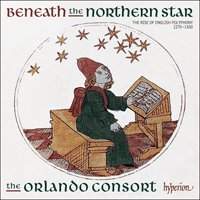Texte paru dans: / Appeared in: |
|
| Highly recommended |
Outil de traduction ~ (Très approximatif) |
|
Reviewer: J.
F. Weber
This remarkable collection of
English polyphony from the late 13th to early 15th century may offer as many
as 10 unrecorded selections. The Alanus piece was recorded by Crawford Young
on a CD titled Fleurs de vertus and in Musica Reservata’s LP Music
from the Hundred Years’ War. Ave mundi rosa and Kyrie Cuthberte
prece are on a CD titled Flyleaves by the Liber unUsualis group,
while the latter piece is also on an early Russell Oberlin reissue with the
Damett piece (Fanfare 18:2). The Byttering piece is on the Hilliard
Ensemble’s Old Hall collection (15:3), Stella maris nuncupatis is on
Deo Gratias Anglia (36:3), and the Chirbury piece is on a Pro
Cantione Antiqua LP (4:5). Nothing is repeated from the Orlando Consort’s
previous program, The Call of the Phoenix (26:4). Hence it is a rich
assortment of unrecorded music of this period along with other pieces widely
scattered on records.
The program progresses
chronologically through the first five anonymous selections and Alanus’s
piece. The rest are taken from the Old Hall manuscript (OH), the most
important source of English music of this period and significant for its two
leading lights, John Dunstaple and Leonel Power. The latter two, each
represented by two unrecorded pieces, are of particular interest, notably
Dunstaple’s motet Dies dignus/Demon dolens/Iste confessor, which
honors St. Germanus of Auxerre, a fifth-century bishop of Auxerre who fought
the heresy of Pelagianism in Britain and died in Ravenna; the church of St.
Germain-l’Auxerrois, across the street from the Louvre, is dedicated to him.
(St. Germain des Prés on the left bank is named for a sixth-century bishop
of Paris.) The Damett and Byttering pieces figure around the marriage of
Henry V and Katherine of Valois, the one interceding for Henry through St.
George, the other honoring Katherine’s patron saint. The development of style is most evident from the first piece, Alleluia, Christo iubilemus, a troped alleluia verse for the third Mass of Christmas that strikes me as an overlooked gem. This is a Medieval piece, and what follows moves into new styles of composition until we reach the two leading composers of 15th-century England. The Orlando Consort, four unaccompanied men who have sung together (with only one member replaced along the way) since 1988, bring exquisite purity of tone, accuracy of intonation, and clarity of enunciation to music that they grasp intuitively. The closest competing recording is the Byttering piece as the Hilliards sang it. This is a valuable addition to recordings of early English polyphony, complementary to anything you already have. Highly recommended. | |
|
Support us financially by purchasing this disc from eiher one of these suppliers. Un achat via l'un ou l'autre des fournisseurs proposés contribue à défrayer les coûts d'exploitation de ce site. |
|
|
|
|
|
Cliquez l'un ou l'autre
bouton pour découvrir bien d'autres critiques de CD |
|




